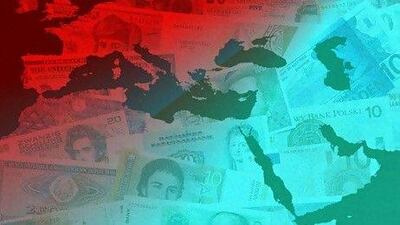International financial institutions have spent hundreds of billions of dollars to avert disaster in the euro zone, but have pledged only a tiny fraction of that amount to help the economies convulsed by the Arab Spring.
Some economists believe the Middle East and North Africa are being told, politely but firmly, to take care of their own.
"The message is that the Arab world is enormously wealthy and should be capable of looking after itself. It's inevitable Europe will look after itself first, and the Middle East should do the same," says Simon Williams, the chief Middle East economist for HSBC.
Dr Nasser Saidi, the chief economist at the Dubai International Financial Centre, says: "Western financial institutions have been caught out by what's happened in the Middle East, and are scrambling to make themselves relevant."
The IMF is one of the biggest contributors to the European bailout, handing over about 25 per cent of the package of handouts, debt guarantees and loans, which total about US$1 trillion (Dh3.67tn).
In contrast, the IMF has pledged a relatively meagre $3 billion to Egypt, less to Tunisia, and nothing so far to strife-torn Libya, Yemen or Syria.
Even allowing for the comparative size of economies and populations, the strategically vital Middle East and North Africa (Mena) region seems to be getting short changed.
When the Group of Eight (G8) leading economies met in France last month and agreed a $20bn aid package to Egypt and Tunisia, it was hailed by Western politicians as a "reward" for the overthrow of oppressive regimes.
It was even intended as a spur to further political action in the region. "Our aid is conditional: we will do more if they [the Arab reformers] do more," said the European Commission president Jose Manuel Barroso.
But the G8 package pales beside the sums involved in the euro-zone bailout.
The issue is further complicated by the fact that some economic powers in the Mena region are handing out large sums of money to persuade Arabs notto do more, as Mr Barroso put it.
Saudi Arabia has committed itself to a spree of public-sector investment estimated at some $130bn. While the investment of energy revenues on such a level will undoubtedly act as a stimulus to its economy, it is at least in part aimed at heading off dissatisfaction in some parts of the country.
A GCC aid package of some $20bn for Oman and Bahrain is also intended to calm unrest in those countries.
At the heart of the debate is Egypt, with the biggest population in the Mena region and one of the most important economies.
Far more people live in Egypt than in the combined three main European recipients of aid, Greece, Ireland and Portugal, while its GDP is about half their aggregate.
Yet while the three euro-zone casualties have been the beneficiaries of about $250bn of IMF generosity, Egypt has had a total of $40bn pledged, most of it from the $20bn "reward" from the G8.
The World Bank has come in with a $2bn loan to Egypt, about the same value as the US combination of loans and debt forgiveness.
Bilateral aid from individual countries such as France and the UK may add another few billion.
In contrast, Saudi Arabia and Qatar have been the source of loans, investment and grants estimated to eventually be worth about $14bn, according to research by HSBC.
Even so, it does not look as though this will be enough to prevent acute short-term problems for the Egyptian economy.
"The general preference seems to be for debt relief or development projects - a stance that may boost longer-term growth prospects but will do little to meet near-term financing needs," says Mr Williams.
The IMF's $3bn is a standby facility to be used if public finances teeter on the brink, but in any case will not be enough in that extreme situation: projections show a $28bn fiscal shortfall in 2011-2012.
This would leave private banks to fund the shortfall, exactly the situation the EU has been trying so hard to avoid in Greece.
Dr Saidi believes the international financial community is not doing enough to support the Mena region through what he calls "the Arab firestorm", and is proposing a radical alternative, based primarily on the region's own resources.
He believes that the revolutions the Arab world has already witnessed this year, and those that may still come in Yemen and Syria, leave the region vulnerable on a range of political, social and economic levels.
Those vulnerabilities can be addressed only by strategically directed, long-term investment, which Dr Saidi concludes should come from a Mena region bank for reconstruction and development.
Such an institution could be almost self-financing, through the premium on oil prices that the regional crises has caused, and would be primarily funded by GCC members, but with the involvement of other governments and global institutions.
"Its scope and mandate would be similar to the post-1989 effort to rebuild Central and Eastern Europe," he says.
That effort was directed mainly by Europeans themselves.
In the apparent absence of serious international financial interest, it looks like the Arab world will have to develop a similar spirit of self-reliance.

